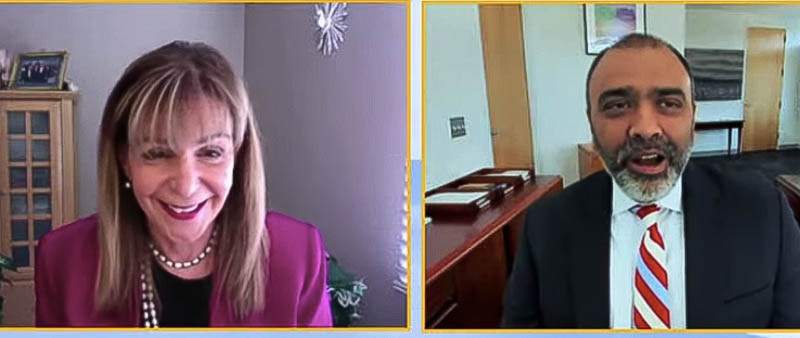Scientists laid groundwork for COVID vaccine over 30 years, says AAAS president
 National Press Club Board member Deborah Silimeo moderated a virtual Headliners event Monday featuring Sudip Parikh, CEO of the American Association for the Advancement of Science. Photo: Al Teich.
National Press Club Board member Deborah Silimeo moderated a virtual Headliners event Monday featuring Sudip Parikh, CEO of the American Association for the Advancement of Science. Photo: Al Teich.
Sudip Parikh, CEO of the American Association for the Advancement of Science, can pinpoint the exact 2005 study that laid the groundwork for the large-scale development and distribution of COVID-19 vaccines — a celebrated feat of science that promises to stamp out a global pandemic. The study was one of a wave of pioneering studies that won federal funding as Congress, between 1993 and 2003, doubling the budget of the National Institutes of Health, he said.
“There’s a 30-year story behind that overnight success,” Parikh said during a National Press Club virtual Headliners event Monday morning.
Parikh, whose 173-year-old organization encompasses the work of about 120,000 scientist members, lamented the public disinvestment in scientific research that has occurred since.
Today, fewer than one out of five research proposals receive federal funding, he said, down from one in every 3 proposals that were funded when lawmakers were increasing the NIH budget.
“It’s harder to get riskier projects funded,” he said.
With the Biden administration and Congress considering a $2 trillion infrastructure plan, Dr. Parikh believes now is the time to put scientists in top advisory positions and allocate the funding necessary to rebuild the country’s research capabilities.
Public officials, he said, should be leaning on scientists to find solutions for food and water insecurity, climate change, electric grid modernization — and how to create a new generation of jobs and economic vitality as technology upends the labor force.
The association’s staff estimated President Joe Biden’s infrastructure plan would equate to annual increases of 25% for the National Science Foundation over the next five years, outside of the annual appropriations process.
“That is transformational,” he said. That level of funding would “impact not just the basic research but also see it translated into technologies and products that drive the economy.”
Parikh noted the bipartisan agreement in Congress on the need for the U.S. to keep pace with countries like China and Russia as well as allies in Europe on critical technologies. The U.S. has also long experienced a “brain drain” of scientific talent to other countries.
“We’ve got to get past the political paralysis,” he said. “This time, different than any time in my 22 years in DC, everyone has said they’re on board.”
On the question of decarbonization, Dr. Parikh said the federal government “lacks coordination” and lacks a “whole of government” approach among the more than 20 federal agencies that conduct research.
“We need to have a national plan for that,” he said. “Most of our competitors have plans.”
While not necessarily advocating for a “Department of Science” with an overly bureaucratic hierarchy, Parikh recommended the White House establish a Cabinet-level science adviser to provide streamlined insight on issues as varied as housing policy and military strategy.
Scientists at all levels can be better communicators to the public and media, too, to combat some of the misinformation surrounding science. “We’ve got to make sure we, as scientists, are participating in the community, and that also means participating with journalists.”
After all, Dr. Parikh said, there is a lot to talk about.
“It seems really strange to say it during a pandemic, but we live in absolutely wondrous times of discovery,” he said. “The pace of discovery and innovation has never been faster.”
